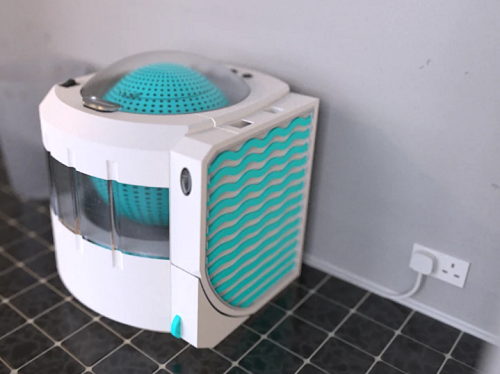Showering students use over 16 billion litres of water a year in the UK. Courtesy Healthline.
Multiple billions of litres of water go un-necessarily to waste every year thanks to people who use laundromat and communal washing facilities. Two smart students from the UK decided to flush this problem down the drain with a new device that helps them wash their clothes as they shower. By Jeremy Torr.
London, December 2020. “England is set to run out of water within 25 years,” warns Paramveer Bhachu, a student at Brunel University London’s Product Design course. “Around 16 billion litres of water are wasted every year, many because of insufficient student laundry facilities,” he adds. So Bhachu, together with fellow student Joanna Power, decided to do something about it – and maybe make a viable business out of the idea too.
“We could save enough drinking water for the entire population of Sweden”- Bhachu.
The two innovators worked for the duration of their course on what they called the Lava Project. The objective was simple: to use water that previously flowed freely down the drain from every shower, and use it to wash clothes instead. Simple, and in hindsight, obvious. Now branded the Lava Aqua X, their solution has just won the London Lord Mayor's Entrepreneur Competition (LMEC) for business innovation and sustainability.
The idea sprang from an article that detailed just how much water that students waste, says Power. "As a student myself I noticed that a lot of students (just said) okay we don’t pay the water bills, it doesn’t really matter how much we use,” she explains. “I remembered back in my first year I was mostly washing my clothes in the sink and flushing a lot of water un-necessarily down the drain. I just thought, I’m sure we can do better than this,” she remembers.
The Lava Aqua X is small, portable - and very sustainable. Courtesy Lava.
Power tossed a few ideas around and put together a cardboard mock up of a portable washing machine that used saved shower water. “We made a lot of cardboard prototypes and did a lot of computer aided engineering too. At first it looked really boxy and gross,” she says. But they persevered, and came up with a design that collected water from the floor of a shower, then filtered it and reused the water to clean a small load of clothes such as students and laundromat users usually wash. Designed for the non-family or home washload, it is light and portable, and as well as more water-efficient it turned out to be able to wash clothes in a third of the usual time.
“Back in my first year I was mostly washing my clothes in the sink.” - Power. Courtesy Lava.
Power worked with Bhachu on the marketing and pretty graphics, and they refined their product that, as well as being good for the planet, would hopefully allow them to avoid the traditional communal washing facilities - which are often overcrowded and expensive as well as unsustainable.
“We were both thrilled and grateful to have reached the finals of the LMEC, and were quite nervous about pitching as the majority of contestants already have registered businesses,” said Power at the finals, “but we are glad to have come this far.”
As well as the LMEC, the duo had come to the notice of the Red Bull Basement (RBB) which was looking for new ideas that could help initiate positive change for the planet. They put in for the RBB initiative in the face of competition from over 3,500 other student innovators from around the globe, and were selected as one of 38 teams in the initial cut.
They then went on to participate in a four-day Red Bull Basement Global Workshop - an immersive, collaborative experience in which teams could network with other selected innovators to thrash out ideas and design and marketing strategies..
“The time we spent in the Red Bull Basement allowed us to test our product with engineering simulations, to apply for trademarks and design rights, and to future proof our design and our business,” said Bhachu. He noted that as the design became more and more practical and usable, it also became more valuable, environmentally. If every student in the UK was to start using their design, said Bhachu, the country should be able to save enough drinking water for the entire population of Sweden for a year, he estimates.
"A key thing with product design," he adds, "is you can have a brilliant idea that solves a problem, saving energy or saving water, but if it costs more than an ordinary solution then no-one’s going to buy it.
Power adds that now ‘it’s a case of getting it made and putting it in front of people and being like: See! See! See! It works!’. “We’ve created a product that not only does good to the world, but is a cheaper and better alternative for (people) to use."
Clear (and clean) Result!





